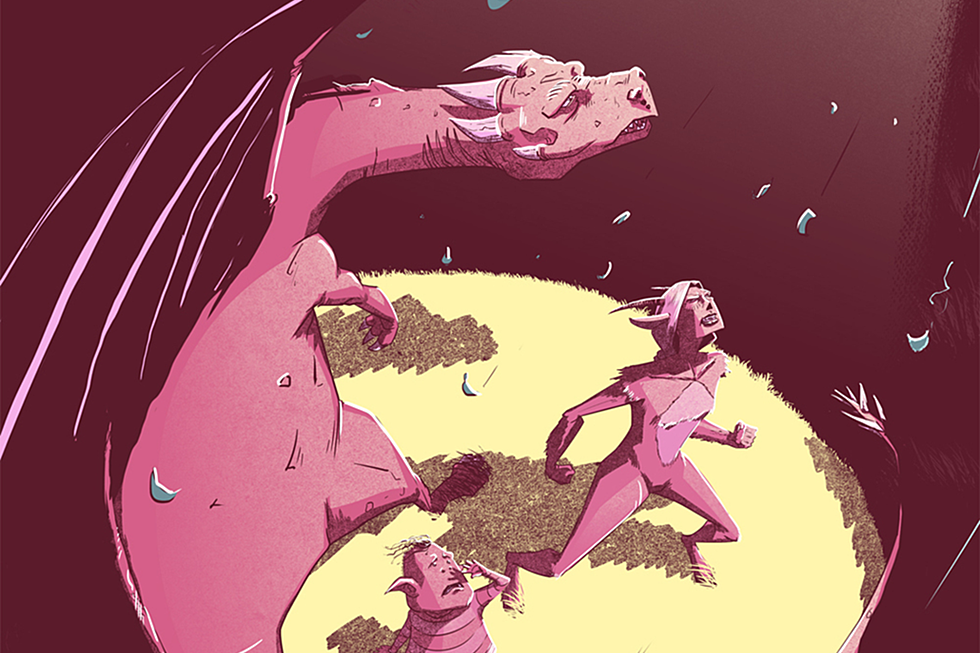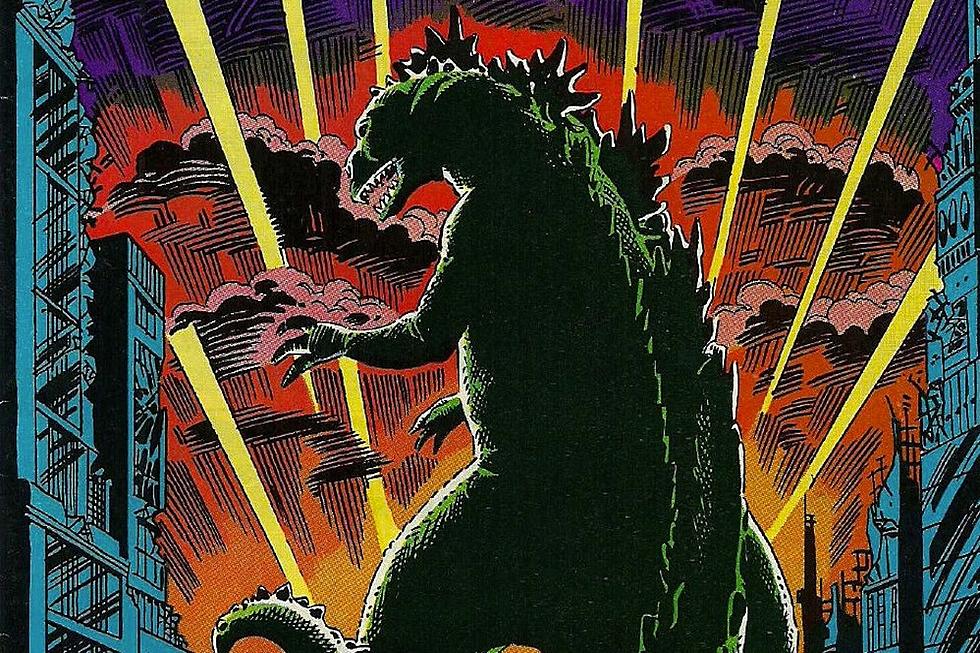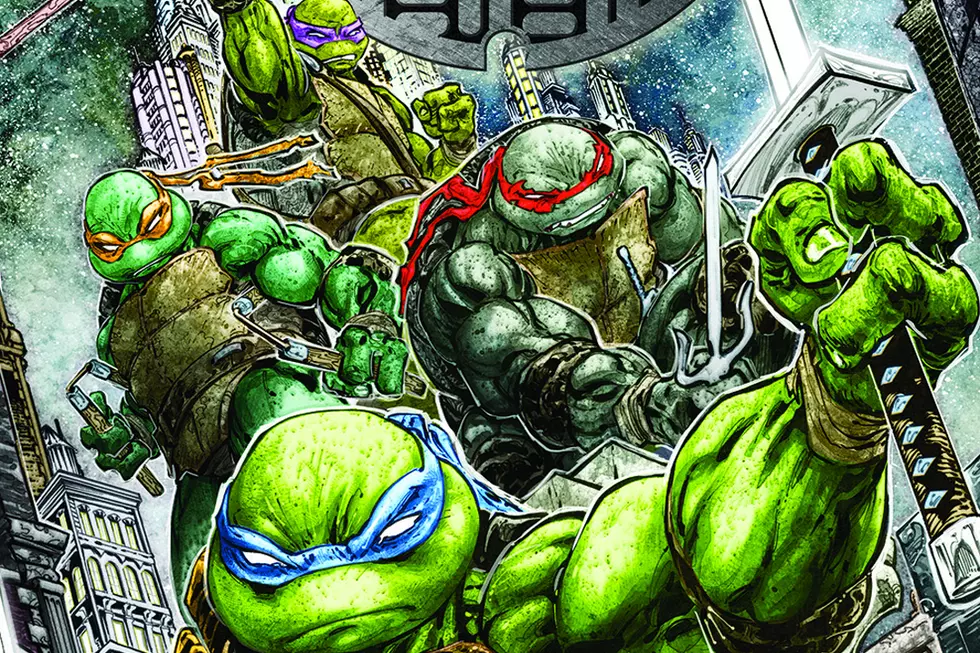![Unrepentant Evil Bastards: Writer Paul Allor Reveals The Secret History of Cobra In ‘G.I. Joe’ [Interview]](http://townsquare.media/site/622/files/2014/07/Joe01.jpg?w=980&q=75)
Unrepentant Evil Bastards: Writer Paul Allor Reveals The Secret History of Cobra In ‘G.I. Joe’ [Interview]
When Paul Allor's "secret history of Cobra" story was first announced by G.I. Joe comics publisher IDW, I immediately took notice. The idea of a long history for Cobra that would see ninja and pirate versions of Cobra Commander was something so amazing that I was shocked it had never been done before. It turned out, however, that this long history was only a part of what Allor would get to do, moving from that complicated secret history into a lean, thrilling adventure for the G.I Joe team.
Now, with Allor's run alongside artists Steve Kurth, Alex Cal, S.L. Gallant, Shawn Lee, Robert Atkins, Chris Evenhuis, Atilio Rojo and Nicole Virella being collected this week in a paperback called G.I. Joe: Siren Song, we spoke to Allor to find out about how much of Cobra Commander's secret history was true, why he built the story around a mother trying to save her child, and just what it was about Big Boa that needed a comeback.
ComicsAlliance: When the story was first announced, the focus was definitely on the first two issues and the look back at the Cobra Commanders of the past. From my understanding, that's how you had originally planned it.
Paul Allor: Right.
CA: At what point did you realize that you wanted to, or were going to have to expand that and make it the driving force of a larger story?
PA: I don't think a lot of people noticed this, but the first issue was actually 28 pages of story. The next one goes back to the standard 20 pages. That's because the first two issues were actually written as one 48-page one-shot, and then [IDW] decided that they were going to make it part of the regular G.I. Joe book, which I was very happy about. Then, John Barber, the editor, asked me if I was available to write two more issues after that, and I was like, "Hell yeah!" So that's why it has the unusual structure of having a Cobra-focused flashback sequence for the first two issues, and then a more traditional, straightforward G.I. Joe story in the latter half.
CA: When they told you that you had two more issues, was it just the natural idea to go in and continue the story about Siren?
PA: Yeah. I think that John suggested that. I can't quite remember, but I assume that's what they would want me to do, keep that going. It's a different story, and I think they work as two different two-issue arcs, but they definitely build off each other.
CA: One of the things that really facilitates your story and marks the difference between the IDW continuity and the original Marvel run is that IDW did the big Cobra Civil War, where Cobra Commander was killed and replaced. It was established pretty early on that the potential was there for multiple Cobra Commanders. Was that storyline the trigger that got you thinking, "Well if there were two, there could be more"?
PA: It was, absolutely. After they had the issue where Cobra Commander was killed, there was an interview that the editor at the time did where he just made a very off-hand comment in response to a question, like, "Yeah, maybe at some point we'll go back and tell stories of past Cobra Commanders," and I was just like "Yes, I would like to do that." That really got me excited and got my brain churning almost instantly on the idea of all these Commanders throughout history. I love stories that mix historoy and off-the-wall genre fiction, so this was right up my alley. I dug that idea.
CA: It's something that you and I have talked about before, because Destro has that history -- he's James McCullen Destro XXIV, so there's 23 more in the past -- but it's never been applied to Cobra as a whole, but that idea also came into play during Fred Van Lente's run as writer of G.I. Joe, where Joe Colton and the original Adventure Team were this prototype for the G.I. Joe unit.
PA: Yeah, I found that really interesting. I loved Fred's run, and that's why -- he gave it a real sense of depth and history.
CA: Those first two issues literally have Pirate Cobra Commander and Ninja Cobra Commander, and they feel really toyetic. Did you run into anything that Hasbro didn't want you to do, or were they just like "Yes, these will eventually make amazing action figures."
PA: [Laughs] Neither! They were totally cool. I kept expecting at some point to be shut down, because I'm not really a big deal in the comics industry by any wild stretch of the imagination, but they're letting me create five new Cobra Commanders. I kept waiting for the hammer to fall and someone to say "no, you can't do that," but they never did. At the same time, though, there was never any discussion of making them into toys. I would be shocked to discover if they ever did. I'd be absolutely delighted, but I don't anticipate that happening.
CA: Did you always plan on doing more with Siren?
PA: I hoped that someone would pick the story up. I didn't think it would be me, but I hoped that someone would take that character and run with it, and that she'd become a part of the regular cast, so to speak, so when I got the opportunity to do that myself, that was totally cool.
CA: Did you worry about the shift in how the stories were presented, going from the Cobra history back to the Joes, two very different types of story that are connected to each other?
PA: I was very worried, because it is jarring. I didn't know how people would react, and if it would be seen as a big drop-off from one to the other, but my thought was that if it was going to be different, then run with it and make it different. Whereas the first one is this really complex, baroque structure with these complex elements to it, the second half is pretty much just a really stripped-down story. It's as lean an action story as I could make it.
CA: How quickly did it come together?
PA: It was pretty fast! For the first issue, I was overseas and I had a really short deadline on it, so I remember being in Malta for a comic book convention and then, the day after the convention, sitting in the hotel lobby banging out the first draft of the script, all in one day. That's pretty unusual for me. I'd done a lot of pre-writing and outlining, but the actual script itself, I was just sitting in the lobby knocking it out. The second one I had a little more time for, but still not a lot.
CA: If the first half of the story appealed to me because of its toyetic nature, and I mean that in the best way possible, the second half really works for me because it's got so much of that really Larry Hama-style dark humor to it.
PA: Yeah.
CA: You have this very, very horrifying setup, where Cobra is liberating these children from human traffickers, and then just taking them and training them as their next generation of soldiers. That's a horrifying idea, but then someone refers to them as "Li'l Vipers."
PA: [Laughs] Yeah, one of the Vipers says it. I was quite happy with that. I love it when stories have room for not even minor characters, but background characters, the henchmen, to have a little bit of banter and personality. So yeah, when I was writing it, I came up with that line on the fly. I just found myself typing it, "Stop! You'll hit the Li'l Vipers!" and thought, "Yes, that is perfect. That is what they would call them."
CA: Were you worried about trying to find that balance? That's kind of the trademark of G.I. Joe, that it's rooted in this dramatic military fantasy, but it's also very funny, especially Cobra.
PA: Yeah, absolutely. It was tough. There's a lot of action, a lot of violence, but at the same time, there's a certain amount of comedy and even buffoonery. That can be tough, to walk that line of having humor in there without making anyone seem incompetent to the point where you don't know why it's so hard for G.I. Joe. Because the Joes kind of get their ass kicked on a regular basis in the IDW continuity.
CA: They really do. Things go disastrously for them a lot.
PA: That's one of the things I really love about the IDW continuity, that it goes places that G.I. Joe doesn't often go. Mike Costa is a big part of that, he's one of the guys who really pushes that forward.
CA: Was there any resistance to it on that front, though? Was anyone like, "Hey, maybe don't do this story about kidnapped children?"
PA: No, not at all. There was one thing where, in the original script, Hashtag points a gun at Siren's son when she's trying to get away, and they were like, "Hey, maybe we shouldn't have a G.I. Joe character pointing a gun at a kid," and I was like, "Oh yeah, that makes sense. I didn't really think about that!" But that was the only complaint they had.
CA: That seems like a good editorial call.
PA: [Laughs] Yes, yes, exactly. That was a good note.
CA: Had any of that long-reaching history of Cobra been explored before your story?
PA: Not that I'm aware of. Everything that was in it, I pretty much came up with, so if it was, I didn't find it and hopefully didn't contradict it.
CA: Was there anything you wanted to get to that you didn't have space for?
PA: The project actually ended up being shorter than it was originally planned to be, so I actually wrote it with 12 of these vignettes, and five of them ended up in the book. So there's seven more out there that, hopefully, we'll eventually have room for. There was one set during the Plague, one where Cobra Commander was hanging out with Marie Antoinette, one in Peru during the Viceroyality with conquistadors. Those are a couple of them. I don't want to give them all away, since there's a very miniscule chance that they'll be coming out eventually.
CA: Each story was drawn by a different artist, so I assume that each artist designed their Cobra Commander.
PA: Yes, they did.
CA: Were you involved in that process at all, or was it just, "Hey, he's Pirate Cobra Commander" and let it go?
PA: I wasn't really involved a ton. In the script, and this is what I tend to do with characters in general, I tried to limit my descriptions of the characters to stuff that was necessary, or very personality-based. Other than that, I like to let the artist do their thing, and they all designed them, communicating with IDW and Hasbro. They ran the designs by me and I was just like "Yep, great, that looks awesome."
CA: I'm a big fan of Chris Evenhuis and Joana Lafuente's design for the Commander that appears in the Dante story.
PA: Yeah, Chris is a really talented guy, and I loved a lot of his design work in that story.
CA: Given how heavy it is on Cobra Commander, was there a reason you wanted to frame it with the Baroness, rather than just the Commander himself sending Siren around?
PA: I liked the idea of having it be a very female-led book, and I thought Siren would bounce off the Baroness in a very unique way. Baroness is so deeply cynical, but also so straightforward. If she doesn't like you, you know she doesn't like you. Siren's whole thing is about putting up a front, everything she does is putting up an act. I thought it would be interesting to see the interaction between those two in that regard.
CA: That brings up something that you toy with in an interesting way. Siren's telling stories that may or may not be true. She gets all of this information about the Secret History of Cobra based on Cobra's own documents, and there's a line in the first issue about how her methods are like planting documents. I like the idea of Cobra having this long history, but I also like the idea that it's all completely faked. Was that ambiguity intentional?
PA: The ambiguity was definitely intentional, and that was to not close off avenues for future creators. I couldn't speak to how true or false any of those particular stories are.
CA: Along with Baroness and Siren, you also reintroduce a new female version of Big Boa.
PA: It's kind of funny how that came about. I assumed that someone at Hasbro would be like "no, you can't do that," but again, they were totally cool with it. We were talking about how we needed a character at the end of the third issue who was a drill instructor type, and Steve Kurth, the artist, jokingly said, "Like Big Boa", who had actually been introduced and subsequently killed off in Mike Costa's Cobra book. I, temporarily forgetting that he'd been killed off, went, "Oh, yeah! Big Boa is perfect" before it was pointed out to me that he was killed off. Then Steve, to his credit, was just like, "Well we could just bring back Big Boa as a woman," and I said, "Yes, that is what we were going to do."
When the designs came through, it was so great, because in Cobra, when the original Big Boa was introduced, he looked less cartoony and more like a genuine, real-world bad guy, as befits the tone of that book. But then Steve just basically took the original Big Boa costume and put it on a woman. When I saw it, I was cracking up. Yes, that was perfect. I'm very happy and proud to have made that contribution to the G.I. Joe mythos.
CA: She does not have the giant boxing gloves, though, which is a real missed opportunity.
PA: That's true. I like to think that she does wear the boxing gloves other times, she just doesn't have them at that moment.
CA: I like the idea there, largely because she's like the Cobra version of Granny Goodness and the Apokolips orphanage. They're brainwashing children and training them up as soldiers, and then you have this horrible mother figure, which contrasts with Siren being a mother.
PA: Yeah, and I like that we don't really learn much about her. She's introduced on the last page of my third issue, and I had a lot of people saying, "I can't wait to learn her backstory in the next issue!" and I had to be like, "Yeah, we're... not really doing that." I like bringing in characters and just having them be cool characters that have a niche in the universe. Not everything has a complex backstory or needs to be drawn out. Sometimes stuff can be really cool.
CA: Yeah. Her backstory is that she gets in a fistfight with Roadblock and they beat the crap out of each other for two pages.
PA: [Laughs] Exactly.
CA: You were writing this story at the same time that you were writing the Utrom Empire series about Kraang for IDW's Teenage Mutant Ninja Turtles titles, so I was wondering if there was a particular attraction to doing the "secret history of the villains" type story for you.
PA: Yeah! I really enjoy writing villains. I enjoy trying to flesh them out while still keeping them very villainous. I feel like a lot of times, when writers try to flesh out a villain's backstory, they do it by defanging them. I like showing humanity, but I feel like they do it in a way that excuses their villainy in a way. I like the idea of trying to flesh them out and humanize them while still having them be unrepentant evil bastards. That really appeals to me.
CA: I don't think anyone's coming away from this story not thinking Cobra Commander's a bad guy.
PA: "That Cobra Comander's kind of a good seed! He's a gifted musician who likes walks on the beach!"
G.I Joe: Siren Song is on sale now in finer comics shops and bookstores.
More From ComicsAlliance

![The Usual Suspects Get New Looks In IDW’s ‘Clue’ [ECCC ’17]](http://townsquare.media/site/622/files/2017/03/clue_featured.jpg?w=980&q=75)







